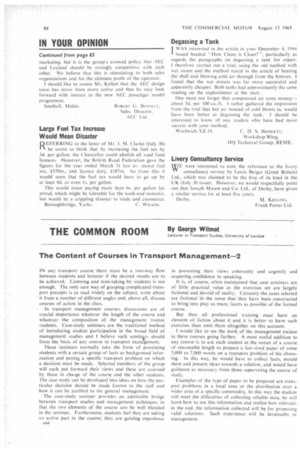THE COMMON ROOM
Page 86

If you've noticed an error in this article please click here to report it so we can fix it.
By George Wilmot
Lecturer in Transport Studies, University of London
The Content of Courses in Transport Management-2
IN any transport course there must be a two-way flow between students and lecturer if the desired results are to be achieved. Listening and note-taking by students is not enough. The only sure way of grasping complicated transport precepts is to read widely on the subject, write about it from a number of different angles and, above all, discuss courses of action in the class,
In transport management courses, discussions are of crucial importance whatever the length of the course and whatever the composition of the management trainee studentS. Case-study seminars are the traditional method of introducing student participation in the broad field of management studies and I believe such setninvs should form the basis of any course in transport management.
These seminars normally take the form of presenting students with a certain group of facts as background information and posing a specific transport problem on which a decision must be made. Selected members of the group will each put forward their views and these are assessed by those in charge of the course and the other students. The case study can be developed into ideas on how the particular decision should be made known to the staff and how it can be justified to the general management.
The case-study seminar provides an admirable bridge between transport studies and management techniques in that the two elements of the course can be well blended in the seminar. Furthermore, students feel they are taking an active part in the course; they are gaining experience it44 in presenting their views coherently and cogently and acquiring confidence in speaking.
It-is, of course, oftenmaintained that case seminars are of little practical value as the exercises set are largely fictional and devoid of reality. Certainly the cases selected are fictional in the sense that they have been constructed to bring into play as many facets as possible of the formal course.
But then all professional training must have an element of. fiction about it and it is better to have such exercises than omit them altogether on this account.
I would like to see the work of the management trainee in these courses going further. A most useful addition to any course is to ask each student at the outset of .a course of reasonable length to prepare a fair-sized paper of some 5,000 .to 7,000 words on a transport problem of his choosing. In this way, he would have to collect facts, mould them and present ideas towards a solution, and Would have guidance as necessary from those supervising the course of study.
Examples of the type of paper to be prepared are transport problems in a local area or the distribution over a wider area of a specific commodity. In this way the student will meet the difficulties of collecting reliable data, he will learn how to use this information and realize how relevant. in the end, the information collected will be for proposing valid solutions. Such experience wilt be invaluable in management.




























































































































